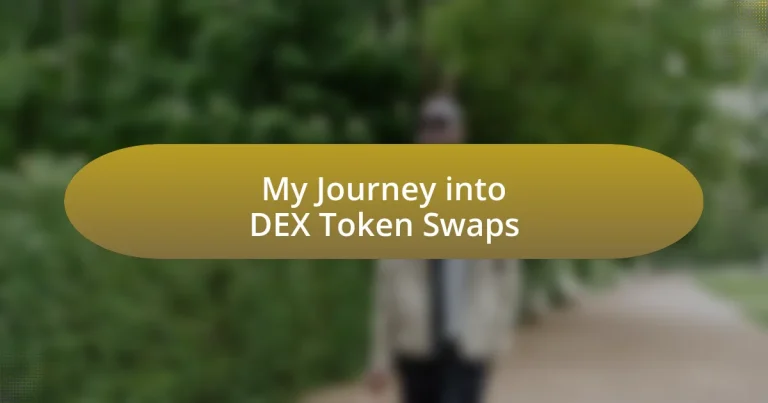Key takeaways:
- Decentralized exchanges (DEXs) empower users with direct trading, privacy, and the use of smart contracts for secure transactions.
- Setting up a cryptocurrency wallet is essential, with options varying in security and accessibility, affecting users’ trading strategies.
- Common pitfalls in DEX token swaps include slippage management, transaction timing, and security practices to avoid phishing and scams.
- Enhancing the DEX experience can be achieved through limit orders, understanding liquidity pools, and thorough research on tokens.
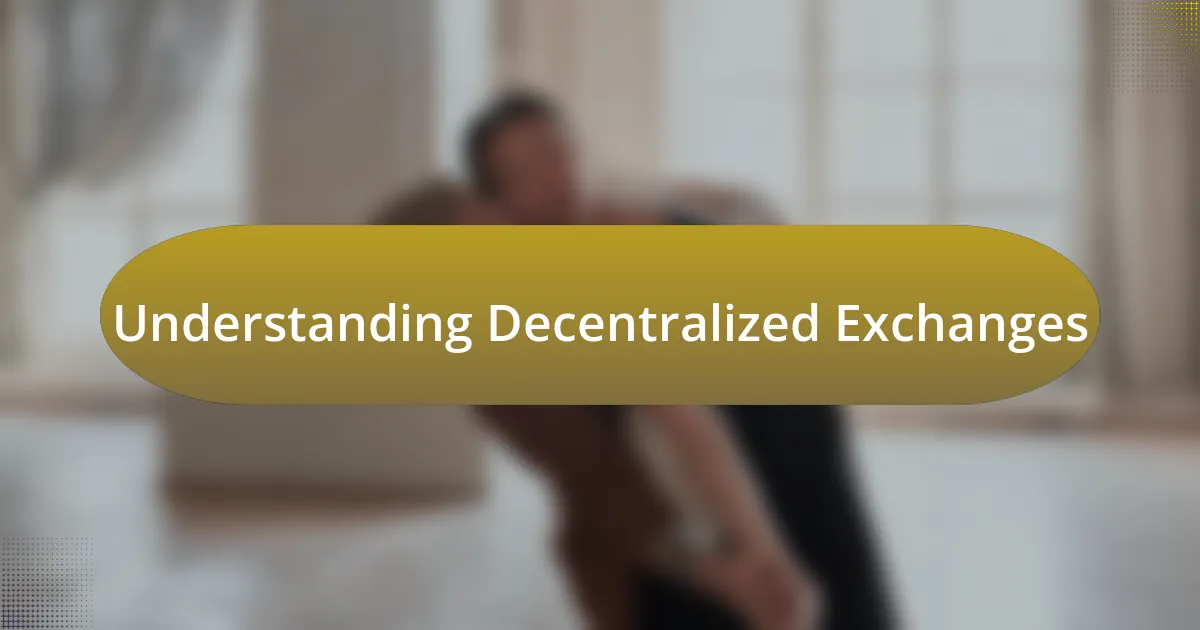
Understanding Decentralized Exchanges
Decentralized exchanges, or DEXs, operate without a central authority, allowing users to trade directly with one another. I remember my first experience on a DEX; the thrill of taking control of my trading was exhilarating. It felt liberating to know that I was part of a system that valued privacy and security over traditional centralized methods.
One of the fascinating aspects of DEXs is their use of smart contracts. These self-executing contracts ensure that trades happen in a trustless manner, meaning you don’t have to rely on a third party. Have you ever thought about how that affects the trust dynamics in trading? For me, it shifted my perception, highlighting the power of technology in building a more open financial system.
Additionally, DEXs often provide greater access to a variety of tokens, especially new and innovative projects. When I explored different tokens on a DEX, I felt like a treasure hunter, discovering hidden gems that weren’t available on mainstream platforms. This experience opened my eyes to the vast potential within the crypto space, reinforcing how DEXs democratize access to financial opportunities.
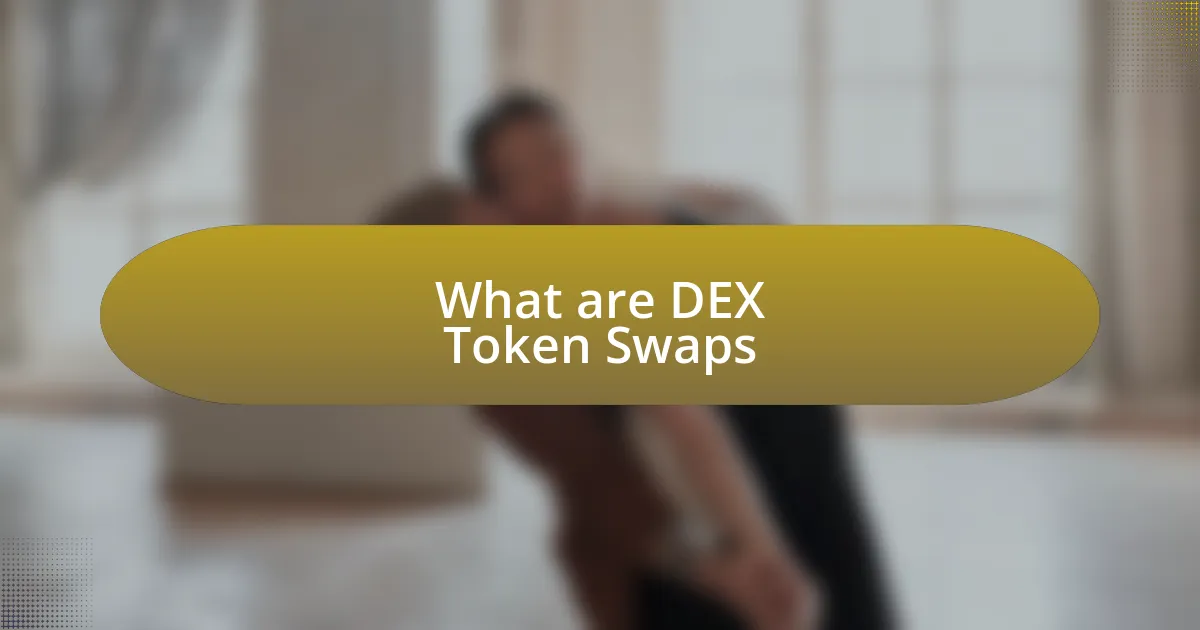
What are DEX Token Swaps
DEX token swaps refer to the process of exchanging one cryptocurrency for another directly on a decentralized exchange. Unlike traditional exchanges where trades are executed through intermediaries, DEX token swaps leverage smart contracts to facilitate the transfer of assets seamlessly and securely. I remember the first time I participated in a swap; there was an empowering sense of immediacy — it was just me and the blockchain, and I could witness my tokens change hands without a delay.
Here are some key features of DEX token swaps:
- User Autonomy: You have complete control over your assets, eliminating the need to trust third parties.
- Anonymity: Most DEXs don’t require personal identification, allowing for more private transactions.
- Variety of Tokens: Access to a broader array of tokens, including emerging projects that may not appear on centralized platforms.
- Cost Efficiency: Often lower fees compared to centralized exchanges due to reduced overhead costs and no intermediary fees.
- Real-Time Trading: Trades can occur almost instantaneously, allowing you to seize opportunities in the market as they arise.
The first time I swapped tokens, I felt a rush of adrenaline — it was an immediate transaction, no waiting for confirmations or worrying about exchange downtime. Each swap felt like a collaboration with cryptography, where I was not just a participant but an integral part of the trade itself. This exhilarating experience shifted my understanding of trading, revealing a landscape where I could maneuver freely, exploring opportunities at my own pace.

Setting Up Your Wallet
Setting up a wallet is one of the foundational steps in your journey into DEX token swaps. I remember the first time I created my wallet; the process felt like opening a door to a new world. I chose a popular wallet option, and in just a few minutes, I had my address and was ready to start. A wallet acts like your personal vault in the crypto space, where you can store, send, and receive various tokens securely.
Once you have your wallet set up, it’s crucial to understand the different types of wallets available to you. Each type has distinct features and security levels. Personally, I transitioned from a software wallet to a hardware one when I realized the benefits of enhanced security for my assets. Hardware wallets are offline, making them much less susceptible to hacks, while software wallets, usually more convenient, come with both benefits and risks associated with being online.
Choosing the right wallet boils down to your comfort with risk and your trading modus operandi. I like to think of it as a personal choice—do you prefer the ease of access or the peace of mind that comes with a more secure option?
| Wallet Type | Features |
|---|---|
| Software Wallet | Easy to access, user-friendly, but susceptible to online threats. |
| Hardware Wallet | Offline storage, high security, ideal for long-term holdings. |
| Mobile Wallet | Convenient for transactions on-the-go, but risk of loss or theft if device is compromised. |
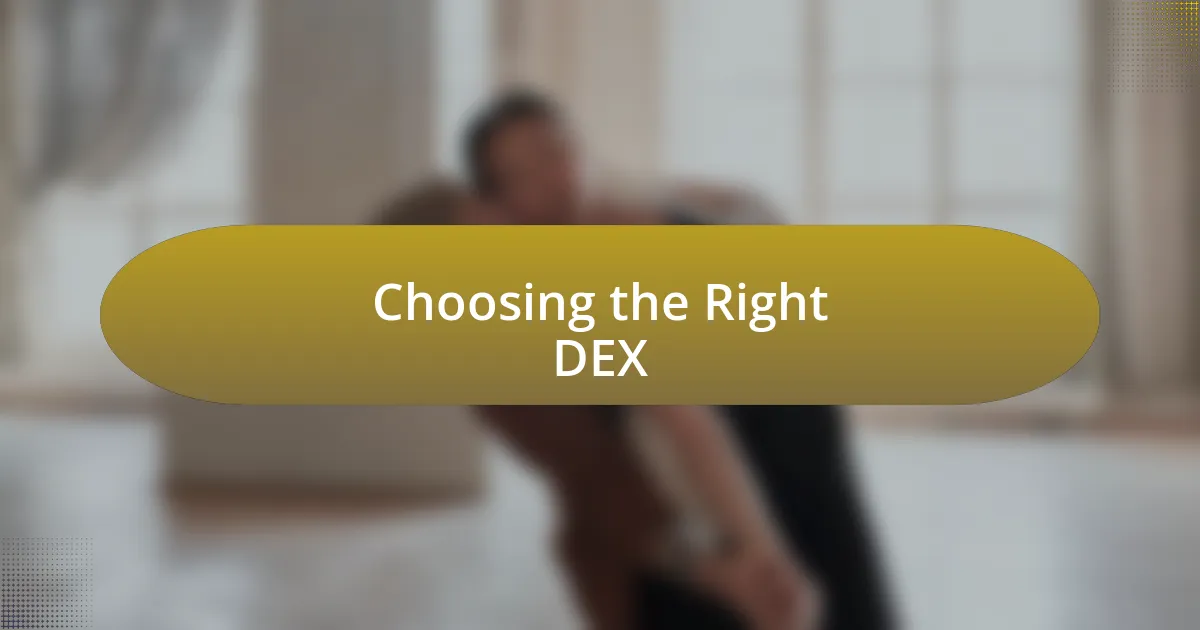
Choosing the Right DEX
Choosing the right decentralized exchange (DEX) can feel overwhelming, especially considering the sheer variety available. I recall spending hours comparing different platforms before I finally made a decision. For me, factors like user interface, fees, and the range of supported tokens became critical in narrowing my choices. It’s essential to find a DEX that aligns with your trading preferences and comfort level.
One thing I learned is to look out for liquidity on a chosen DEX. An exchange with high liquidity typically means better prices and faster transactions. I remember my first experience on a DEX with low liquidity; I ended up with less favorable swap rates, which made me more cautious in future trades. Have you ever felt frustrated by poor liquidity? I certainly have, and it taught me a valuable lesson about doing thorough research before committing.
Finally, don’t forget to consider the DEX’s reputation within the community. I often turn to online forums and trusted reviewers for insights. Their experiences guide me in identifying potential issues that might not be immediately apparent. I believe it’s essential to choose a platform not only for its features but also for its trustworthiness; after all, your investments are at stake. Have you engaged with a DEX community to gain insights? It can lead to a more informed decision.
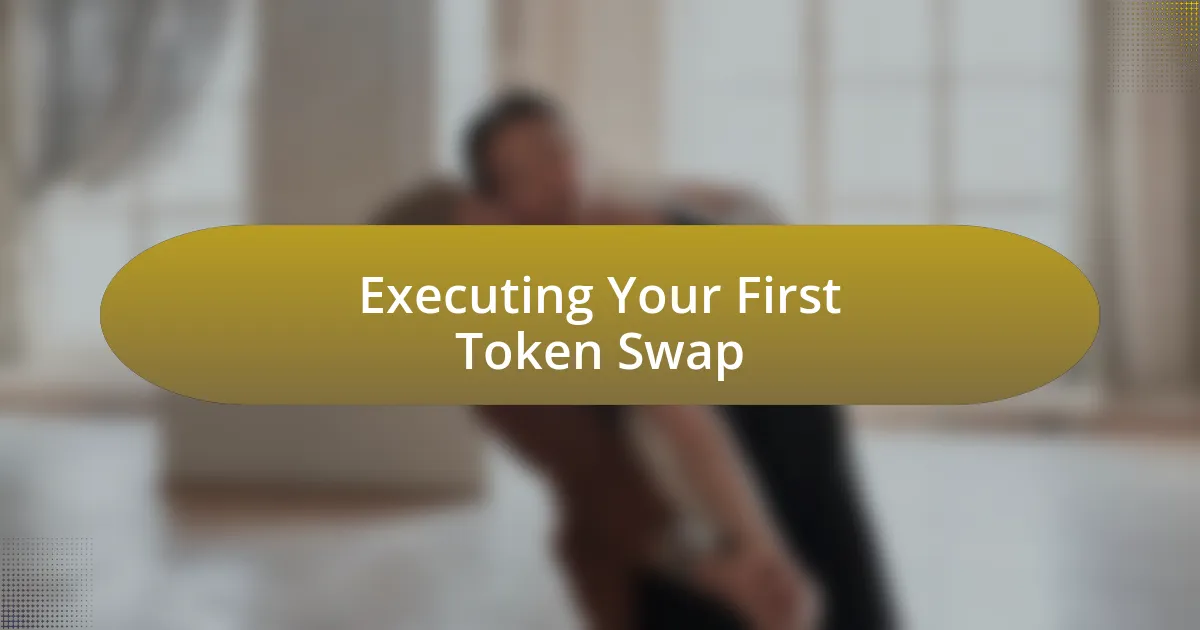
Executing Your First Token Swap
Executing your first token swap is an exhilarating experience, and I remember mine vividly. After setting up my wallet and ensuring I had the necessary tokens, I felt a mix of anticipation and nervousness as I navigated the DEX interface. Did I check everything? I triple-checked the token amounts and gas fees because I wanted to avoid any surprises.
When I finally clicked that “Swap” button, my heart raced. I watched the transaction propagate across the blockchain, crossing my fingers that everything would go smoothly. In those moments, I learned the importance of being patient. Mistakes can happen, but having a calm mindset can help navigate any hiccups. Did I feel anxious about whether my trade would go through? Absolutely, and it taught me the value of taking a breath and trusting the process.
Once the swap was complete, the rush of seeing my new tokens in my wallet was indescribable. It was like opening a gift I had been waiting for! I immediately checked the transaction hash on a block explorer to verify the trade’s success. This part of the process is crucial—being able to track your transaction gives you peace of mind and helps you understand how the blockchain operates. Has tracking your transactions ever made you feel more connected to the crypto world? For me, it truly solidified my journey into the DEX universe.

Common Pitfalls and Mistakes
It’s easy to fall into common traps when executing token swaps on a DEX. One mistake I made early on was underestimating the impact of slippage—the difference between the expected price of a token swap and the actual price. It was frustrating to see my tokens exchanged for much less than anticipated. Have you ever felt that sting? Realizing I had left slippage at its default setting taught me to be more mindful and adjust it according to market conditions.
Another hurdle I encountered involved ignoring the importance of transaction speed. There was a time when I let a trade sit too long, hoping for a better price, only to miss out entirely. The market moves fast, and vacillating can lead to missed opportunities. I learned that timing is crucial; if I wait too long, I might end up trading at a less favorable rate. Have you ever watched a price fluctuate while hesitating? It can be a gut-wrenching experience.
Lastly, I can’t stress enough the importance of security practices. I once clicked a suspicious link claiming to offer better swap rates and ended up exposing my wallet to a phishing attempt. It was a wake-up call that security should always be my top priority wherever I interact with DEXs. I now verify sources meticulously before proceeding, and it makes all the difference. Have you ever doubted a link but clicked anyway? Trusting your instincts can save you from potential disasters.

Maximizing Your DEX Experience
It’s fascinating how small adjustments can profoundly enhance your experience on a DEX. For instance, I discovered that utilizing limit orders was a game-changer for me. Instead of jumping in when prices seemed right, I set specific targets based on my personal strategy, allowing me to execute trades without the pressure of the moment. Have you ever felt that rush of excitement only to regret a hasty decision later?
Understanding liquidity pools can also significantly impact your DEX journey. When I first started, I overlooked how liquidity affects swap rates; it wasn’t until I tried to swap a lesser-known token that I encountered huge price fluctuations. Since then, I always check liquidity. If I’ve learned anything from my experience, it’s that diving into pools with higher liquidity can provide a smoother trading experience. Have you experienced this too?
Lastly, taking the time to research the tokens I’m interested in has paid off immensely. I once invested hastily into a trendy token, only to watch it plummet as quickly as it rose. Now, I dedicate a portion of my time to analyze project fundamentals and community sentiment. By doing this, I feel more confident in my swaps and decisions. Have you ever felt that anxiety about uncertain investments? Thorough research can ease that worry and lead to better outcomes.

